Find Help
More Items From Ergsy search
-
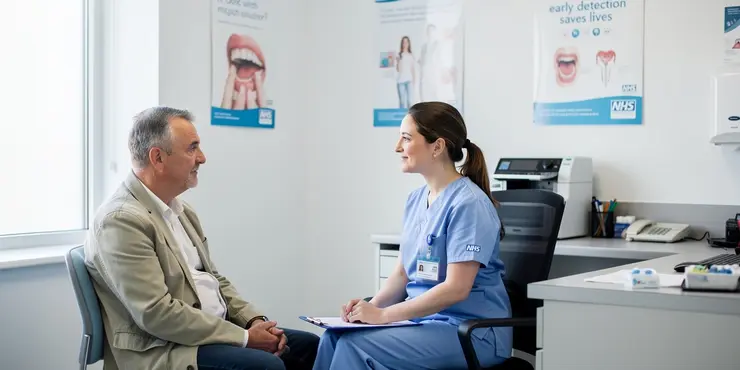
Mouth Cancer Awareness
Relevance: 100%
-
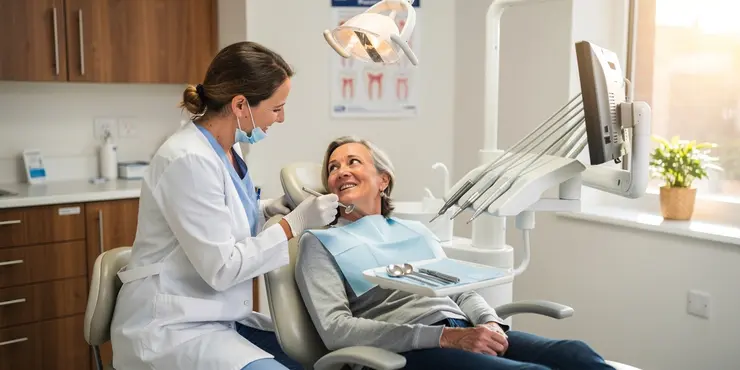
Mouth Cancer Infomercial
Relevance: 75%
-
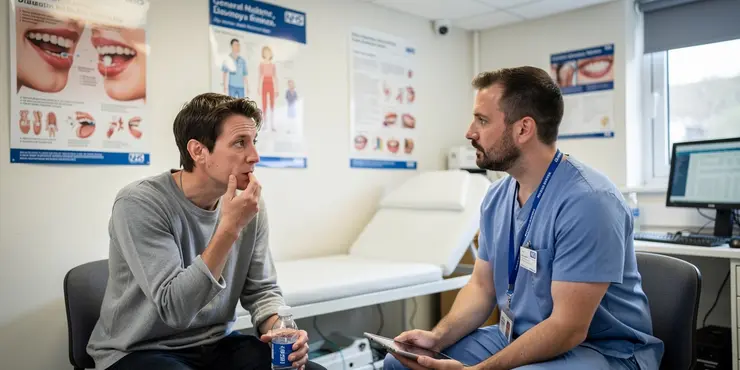
Coping with dry mouth
Relevance: 52%
-

Raising awareness of ovarian cancer
Relevance: 50%
-

Alcohol Awarerness Week
Relevance: 38%
-

Getting to know your Testicles: Testicular Cancer Awareness with Dr James Howarth, Spilsby Surgery
Relevance: 36%
-

Can HPV lead to cancer?
Relevance: 33%
-
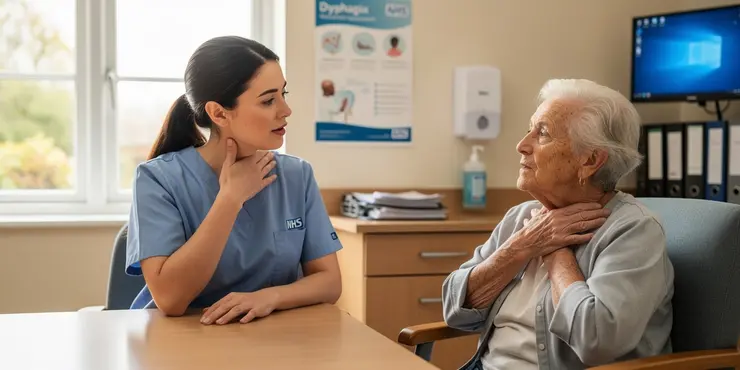
Swallowing awareness - dysphagia
Relevance: 31%
-

Head and Neck Cancer Diagnosis
Relevance: 31%
-

Why is there a surge in bowel cancer?
Relevance: 30%
-
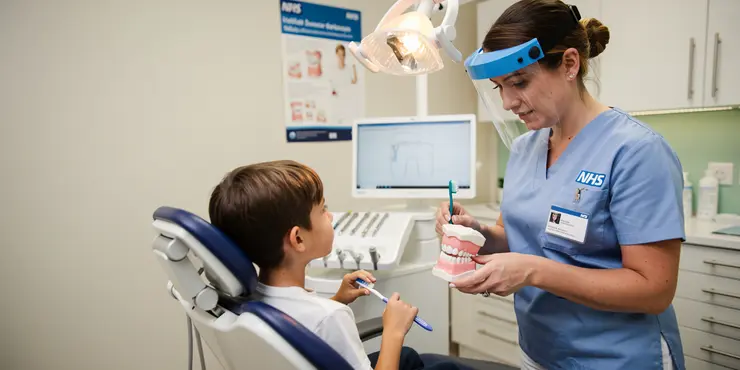
Oral Health Awareness - Tooth Decay
Relevance: 30%
-

Why is it important to increase awareness about CFS?
Relevance: 29%
-

Royal Berkshire NHS Foundation Trust: Radiotherapy for head and neck cancers
Relevance: 29%
-

Bowel Cancer
Relevance: 29%
-

Endometrial Cancer
Relevance: 29%
-

Are younger people being diagnosed with bowel cancer more frequently?
Relevance: 29%
-

Endometrial Cancer
Relevance: 28%
-

Ovarian Cancer
Relevance: 28%
-

Vaginal Cancer
Relevance: 28%
-

What is Cancer?
Relevance: 28%
-

What is colorectal cancer?
Relevance: 28%
-
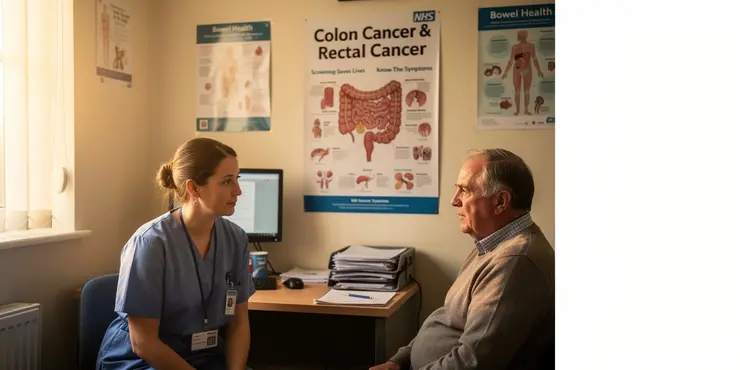
What is the difference between colon cancer and rectal cancer?
Relevance: 27%
-

What is Pancreatic Cancer?
Relevance: 27%
-

How common is bowel cancer?
Relevance: 27%
-

What is testicular cancer?
Relevance: 27%
-

What is testicular cancer?
Relevance: 27%
-

Is testicular cancer treatable?
Relevance: 27%
-

Sue Doherty on hepatitis C awareness
Relevance: 27%
-

World Pancreatic Cancer Day - No Time to Wait
Relevance: 27%
-

How common is testicular cancer?
Relevance: 27%
-

About Breast cancer - signs and symptoms | NHS
Relevance: 26%
-
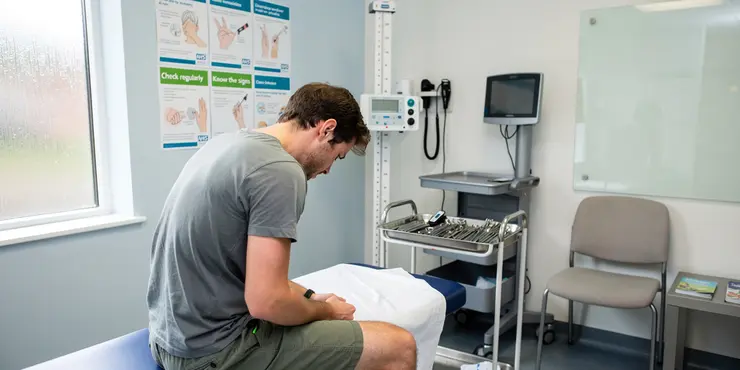
Who is at risk for testicular cancer?
Relevance: 26%
-

What is Prostate Cancer?
Relevance: 26%
-

Am I more at risk of prostate cancer?
Relevance: 26%
-

Skin cancer education
Relevance: 26%
-

Vulval Cancer
Relevance: 26%
-

Endometrial Cancer
Relevance: 26%
-

What is the survival rate for testicular cancer?
Relevance: 26%
-
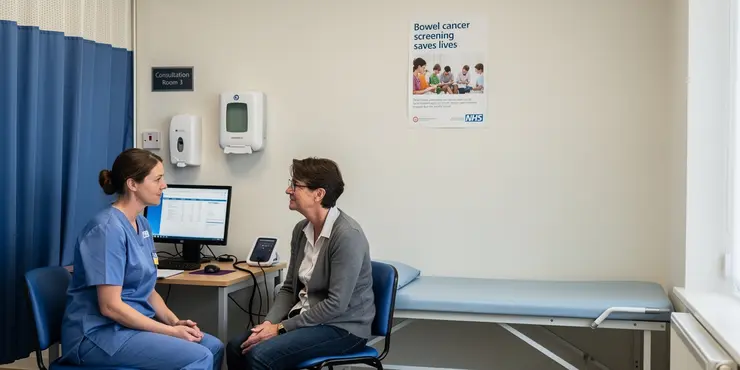
How does increased screening impact bowel cancer statistics?
Relevance: 26%
-

What causes testicular cancer?
Relevance: 26%
Mouth Cancer Awareness
Understanding Mouth Cancer
Mouth cancer, also known as oral cancer, refers to cancer that develops in any part of the mouth. This includes the lips, gums, tongue, the inner lining of the cheeks, the roof of the mouth, and the floor of the mouth. Awareness about mouth cancer is crucial for early detection and effective treatment, especially in the United Kingdom where incidences have been rising.
Risk Factors
Several risk factors are associated with mouth cancer. The most significant ones include tobacco use, heavy alcohol consumption, prolonged exposure to the sun (which can affect the lips), and the human papillomavirus (HPV). It is also noteworthy that a diet low in fruits and vegetables can increase the risk. Genetics and family history can also play a role.
Signs and Symptoms
Early detection of mouth cancer can significantly improve treatment outcomes. Common signs and symptoms to watch for include persistent sores or ulcers in the mouth that do not heal, red or white patches in the mouth, lumps or thickening in the mouth or neck, difficulty swallowing, numbness in the mouth, and unexplained weight loss. If these symptoms persist for more than three weeks, it is vital to seek medical advice.
Prevention and Screening
Preventive measures can significantly reduce the risk of developing mouth cancer. These include quitting smoking, reducing alcohol consumption, using lip balm with sun protection, maintaining good oral hygiene, and eating a balanced diet rich in fruits and vegetables. Regular dental check-ups are also essential as dentists can spot early signs of mouth cancer. In the UK, some dental practices offer mouth cancer screening as part of the routine check-up.
Treatment Options
Treatment for mouth cancer usually involves a combination of surgery, radiation therapy, and chemotherapy. The choice of treatment depends on the stage and extent of the cancer, as well as the patient’s overall health. Early-stage mouth cancers may only require minor surgical intervention, whereas more advanced cancers might necessitate extensive treatment.
Support and Resources
In the UK, numerous support networks and resources are available for those affected by mouth cancer. Charities like Cancer Research UK, Macmillan Cancer Support, and The Mouth Cancer Foundation offer information, guidance, and support services for patients and their families. These organisations also work tirelessly to promote awareness and fund research into better treatments and early detection methods.
Mouth Cancer Awareness
What is Mouth Cancer?
Mouth cancer is a serious illness. It can start in different parts of the mouth. This means it can be on your lips, gums, tongue, inside the cheeks, the roof of your mouth, or the floor under your tongue. Knowing about mouth cancer is important so it can be found early and treated well. In the UK, more people are getting mouth cancer.
What Can Make You Sick?
Some things can make you more likely to get mouth cancer. Smoking and drinking a lot of alcohol are big reasons. Being in the sun a lot can hurt your lips too. Some viruses like HPV can also be a reason. Not eating enough fruits and vegetables can increase the risk. If other people in your family had cancer, you could have a greater chance too.
How to Spot Mouth Cancer?
Finding mouth cancer early can help in getting better. Look for signs like sores or ulcers that do not go away, red or white patches, lumps in your mouth or neck, trouble swallowing, numb feeling in your mouth, and losing weight without trying. If you have these problems for more than three weeks, see a doctor.
How to Stay Safe and Get Checked?
You can do things to lower the chance of getting mouth cancer. Stop smoking, drink less alcohol, use lip balm with sun protection, brush your teeth well, and eat fruits and vegetables. Go to the dentist regularly because they can find early signs of cancer. In the UK, some dentists check for mouth cancer during your visit.
How is Mouth Cancer Treated?
If you have mouth cancer, doctors might use surgery, radiation, or chemotherapy to treat it. What treatment you get depends on how serious the cancer is and how healthy you are. If the cancer is found early, you might only need a small surgery.
Help and Support
There is a lot of help in the UK for people with mouth cancer. Groups like Cancer Research UK, Macmillan Cancer Support, and The Mouth Cancer Foundation can help you and your family. They give information, support, and raise awareness. They also help fund research for better treatments and finding cancer early.
Frequently Asked Questions
What is mouth cancer?
Mouth cancer, also known as oral cancer, refers to cancer that develops in any part of the mouth, including the lips, gums, tongue, and inner lining of the cheeks.
What are the common symptoms of mouth cancer?
Common symptoms include persistent mouth sores, lumps, white or red patches on the gums, tongue or lining of the mouth, difficulty swallowing, numbness in the lip or tongue, and unexplained weight loss.
Who is most at risk for developing mouth cancer?
Risk factors include smoking or using tobacco products, excessive alcohol consumption, excessive sun exposure to the lips, a diet low in fruits and vegetables, and infection with HPV (Human Papillomavirus).
How can I reduce my risk of mouth cancer?
To reduce the risk, avoid tobacco and excessive alcohol, eat a healthy diet rich in fruits and vegetables, use lip balm with SPF, and maintain good oral hygiene. Regular dental check-ups are also important.
How is mouth cancer diagnosed?
Dentists or doctors may perform a physical exam, use imaging tests like X-rays or MRI, and conduct a biopsy where a small sample of tissue is taken for examination under a microscope.
Is mouth cancer treatable?
Yes, mouth cancer is treatable, especially when caught early. Treatments include surgery, radiation therapy, chemotherapy, or a combination of these methods.
Can mouth cancer spread to other parts of the body?
Yes, like many cancers, mouth cancer can metastasize or spread to other parts of the body, such as the lymph nodes in the neck or even more distant organs.
What is the survival rate for mouth cancer?
The survival rate for mouth cancer varies depending on the stage at diagnosis. Early-stage mouth cancers have a higher survival rate compared to those diagnosed at a later stage.
What type of healthcare providers treat mouth cancer?
Treatment often involves a team of specialists including oncologists, otolaryngologists (ENT physicians), dentists, oral surgeons, and maxillofacial surgeons.
Can mouth cancer cause pain?
Mouth cancer can cause pain or discomfort, especially as it progresses. Pain may be felt in the mouth or jaw and can affect eating and swallowing.
Are there any support groups for mouth cancer patients in the UK?
Yes, there are several support groups and organizations in the UK, such as Cancer Research UK and Macmillan Cancer Support, which offer resources and support for mouth cancer patients and their families.
How can I perform a self-examination for mouth cancer?
You can perform a self-examination by regularly checking your mouth in a mirror for any unusual lumps, sores, or colour changes. Pay attention to any changes in sensation or persistent pain. Report any abnormalities to a healthcare provider.
What role does HPV play in mouth cancer?
HPV, particularly HPV16, is known to be a risk factor for oropharyngeal cancers, which affect the back of the throat, including parts of the tongue and tonsils. It's less commonly associated with cancers of the mouth itself but is still a significant risk factor.
Is there a link between oral hygiene and mouth cancer?
Poor oral hygiene can increase the risk of infections and irritation, which may contribute to the development of mouth cancer. Maintaining good oral hygiene is important for overall oral health.
What should I do if I suspect I have symptoms of mouth cancer?
If you suspect symptoms of mouth cancer, you should see your dentist or doctor as soon as possible for an evaluation. Early diagnosis and treatment significantly improve outcomes.
What is mouth cancer?
Mouth cancer is a bad illness in your mouth. It happens when bad cells grow in your mouth.
If you have mouth cancer, you might notice a sore or lump in your mouth that does not go away.
It is important to see a doctor if you feel something is wrong in your mouth.
Tools like picture books or videos can help you learn more about mouth cancer.
Mouth cancer is a type of cancer that grows in the mouth. It can be in the lips, gums, tongue, or inside the cheeks.
What are the signs of mouth cancer?
Mouth cancer can have signs that are easy to notice. Here are some signs to look out for:
- Sores in the mouth that do not heal.
- Lumps in the mouth or on the lip.
- White or red patches in the mouth.
- Having trouble chewing or swallowing.
- Pain in the mouth or ear.
- Loose teeth.
- Changes in your voice.
If you notice these signs, tell a grown-up or a doctor. They can help check if everything is okay.
Here are some signs that something might be wrong:
- Sores in your mouth that don't go away
- Bumps in your mouth
- White or red spots in your mouth, on your gums, or on your tongue
- Trouble swallowing food
- Your lip or tongue feels numb
- Losing weight for no reason
Tools that might help you understand:
- Picture books showing different symptoms
- Audio guides that explain these signs
- Talking to a doctor or a nurse
Who can get mouth cancer?
Some people are more likely to get mouth cancer. These people might:
- Smoke cigarettes or use tobacco
- Drink a lot of alcohol
- Spend lots of time in the sun without protection on their lips
- Have HPV, a type of virus
If you are worried, talk to a doctor. You can ask someone you trust to go with you or to help you understand what the doctor says.
What might increase the chance of getting sick:
1. Smoking or using tobacco can be bad.
2. Drinking too much alcohol is not good.
3. Staying in the sun too long, especially on lips, is not safe.
4. Not eating enough fruits and veggies can make you unhealthy.
5. Having a virus called HPV can cause problems.
Helpful Tips:
- Try to stop smoking and drinking less alcohol.
- Wear a hat and use lip balm with sun protection.
- Eat lots of fruits and vegetables every day.
- Talk to a doctor about HPV and staying healthy.
How can I lower my chance of getting mouth cancer?
You can do some things to help keep your mouth healthy and lower the chance of cancer.
Here are some helpful tips:
- Don’t smoke: Smoking can harm your mouth.
- Drink less alcohol: Too much alcohol can be bad for your mouth.
- Eat healthy food: Fruits and veggies are good for you.
- Visit the dentist: Go to the dentist for check-ups. They can help keep your mouth healthy.
- Use sunscreen on lips: If you are outside, use lip balm with sunscreen.
- Ask for help if you need: Talk to a doctor or a dentist if you have questions.
Using these tips can help keep your mouth healthy and lower the chance of cancer.
To stay healthy, try these tips:
- Don't smoke or use tobacco.
- Don't drink too much alcohol.
- Eat lots of fruits and vegetables.
- Use lip balm with sun protection (SPF).
- Brush your teeth and keep your mouth clean.
- Visit the dentist often.
How do doctors find out if someone has mouth cancer?
Dentists and doctors help you by looking at your body. They might take pictures of the inside of your body using special machines like X-rays or MRI. Sometimes, they take a tiny piece of your body to look at it closely with a microscope.
Can doctors help with mouth cancer?
Yes, doctors can treat mouth cancer. It is best to find it early. There are different ways to treat it. These include surgery, where doctors take out the cancer. They might also use radiation therapy, which is strong rays to kill cancer cells. Another way is chemotherapy, using medicine to fight cancer. Sometimes, doctors use more than one treatment together.
If you want help to understand more, you can ask someone you trust to explain it to you. You can also use pictures or apps that make reading easier.
Can mouth cancer move to other parts of the body?
Yes, mouth cancer can spread to other parts of the body. It can move to places like the lumps in the neck or other far-away parts.
How many people live after getting mouth cancer?
If you or someone you know has mouth cancer, it is important to talk with a doctor. They can give you support and information about what to do next.
Using pictures or videos might help understand more about mouth cancer. Ask someone you trust to explain things if you find it hard to understand.
How well people do after getting mouth cancer depends on when doctors find it. If they find it early, people have a better chance of getting better. If they find it later, it's harder to get better.
Who helps if you have mouth cancer?
Doctors work together to help with treatment. This team can include cancer doctors, ear and throat doctors, dentists, mouth surgeons, and face surgeons.
If you need help reading, you can try using pictures or talking with a friend. Reading aloud or using apps that read for you can also be helpful.
Does mouth cancer hurt?
Mouth cancer can hurt, especially as it gets worse. You might feel pain in your mouth or jaw. This can make it hard to eat and swallow.
If you need help, you can use tools like picture cards to show how you feel. You can also talk to a helper or use special apps that help you communicate.
Are there support groups for mouth cancer patients in the UK?
Yes, there are groups in the UK that help people with mouth cancer. These groups give advice and let people talk about their feelings. Talking can make you feel better.
To find a group, you can:
- Ask your doctor for help.
- Look online for mouth cancer support.
- Call a cancer helpline for advice.
Going to a support group can help you feel not alone. You can share stories and learn from others.
Yes, there are places in the UK that can help. Some are called Cancer Research UK and Macmillan Cancer Support. They give help and information to people with mouth cancer and their families.
How can I check my mouth for cancer?
You can check your mouth at home. Use a mirror to look for any strange bumps, sores, or colour changes. Notice if anything feels different or hurts for a long time. Tell a doctor or nurse if you find something not normal.
How can HPV make you sick with mouth cancer?
HPV, especially a type called HPV16, can make you more likely to get some kinds of throat cancer. These cancers are in the back part of your throat and can also affect your tongue and tonsils. HPV isn't as often linked to mouth cancer, but it is still an important thing to know about.
Does keeping your mouth clean help stop mouth cancer?
Looking after your mouth is important. It helps keep you healthy. Some doctors say that keeping your mouth clean might help stop mouth cancer.
Brush your teeth every day. Using mouthwash is good too. Go to the dentist for check-ups. These things help keep your mouth healthy.
If you have any worries, talk to your doctor or dentist. They can help you understand more.
Not taking good care of your mouth can make you get sick and your mouth can get sore. This can also make it easier to get mouth cancer. It's important to keep your mouth clean and healthy.
What to Do if You Think You Have Signs of Mouth Cancer
If you think something might be wrong with your mouth, here is what you can do: 1. **Tell a Grown-Up or Someone You Trust:** Talk to someone you trust, like a parent or a friend. 2. **Visit a Doctor or Dentist:** Ask to see a doctor or dentist. They can check your mouth. 3. **Write Down Your Symptoms:** Make a list of how you feel. It can help you remember when you talk to the doctor. 4. **Look for Help Tools:** Use tools like voice recorders to remember what the doctor says. Remember, doctors are there to help you feel better!If you think you might have signs of mouth cancer, you should visit your dentist or doctor quickly. They can check to see what's wrong. Finding and treating it early helps a lot.
Useful Links
This website offers general information and is not a substitute for professional advice.
Always seek guidance from qualified professionals.
If you have any medical concerns or need urgent help, contact a healthcare professional or emergency services immediately.
Some of this content was generated with AI assistance. We’ve done our best to keep it accurate, helpful, and human-friendly.
- Ergsy carfully checks the information in the videos we provide here.
- Videos shown by Youtube after a video has completed, have NOT been reviewed by ERGSY.
- To view, click the arrow in centre of video.
- Most of the videos you find here will have subtitles and/or closed captions available.
- You may need to turn these on, and choose your preferred language.
- Go to the video you'd like to watch.
- If closed captions (CC) are available, settings will be visible on the bottom right of the video player.
- To turn on Captions, click settings .
- To turn off Captions, click settings again.
More Items From Ergsy search
-

Mouth Cancer Awareness
Relevance: 100%
-

Mouth Cancer Infomercial
Relevance: 75%
-

Coping with dry mouth
Relevance: 52%
-

Raising awareness of ovarian cancer
Relevance: 50%
-

Alcohol Awarerness Week
Relevance: 38%
-

Getting to know your Testicles: Testicular Cancer Awareness with Dr James Howarth, Spilsby Surgery
Relevance: 36%
-

Can HPV lead to cancer?
Relevance: 33%
-

Swallowing awareness - dysphagia
Relevance: 31%
-

Head and Neck Cancer Diagnosis
Relevance: 31%
-

Why is there a surge in bowel cancer?
Relevance: 30%
-

Oral Health Awareness - Tooth Decay
Relevance: 30%
-

Why is it important to increase awareness about CFS?
Relevance: 29%
-

Royal Berkshire NHS Foundation Trust: Radiotherapy for head and neck cancers
Relevance: 29%
-

Bowel Cancer
Relevance: 29%
-

Endometrial Cancer
Relevance: 29%
-

Are younger people being diagnosed with bowel cancer more frequently?
Relevance: 29%
-

Endometrial Cancer
Relevance: 28%
-

Ovarian Cancer
Relevance: 28%
-

Vaginal Cancer
Relevance: 28%
-

What is Cancer?
Relevance: 28%
-

What is colorectal cancer?
Relevance: 28%
-

What is the difference between colon cancer and rectal cancer?
Relevance: 27%
-

What is Pancreatic Cancer?
Relevance: 27%
-

How common is bowel cancer?
Relevance: 27%
-

What is testicular cancer?
Relevance: 27%
-

What is testicular cancer?
Relevance: 27%
-

Is testicular cancer treatable?
Relevance: 27%
-

Sue Doherty on hepatitis C awareness
Relevance: 27%
-

World Pancreatic Cancer Day - No Time to Wait
Relevance: 27%
-

How common is testicular cancer?
Relevance: 27%
-

About Breast cancer - signs and symptoms | NHS
Relevance: 26%
-

Who is at risk for testicular cancer?
Relevance: 26%
-

What is Prostate Cancer?
Relevance: 26%
-

Am I more at risk of prostate cancer?
Relevance: 26%
-

Skin cancer education
Relevance: 26%
-

Vulval Cancer
Relevance: 26%
-

Endometrial Cancer
Relevance: 26%
-

What is the survival rate for testicular cancer?
Relevance: 26%
-

How does increased screening impact bowel cancer statistics?
Relevance: 26%
-

What causes testicular cancer?
Relevance: 26%


